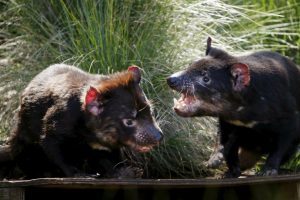Scientists have discovered that the Tasmania Devil population may survive after all. It seems that in the last couple of generations, the creatures have somehow developed a resistance to a highly contagious face cancer that has threatened the species with extinction. Already, about 80% of the animals have disappeared because of the cancer.
The amazing discovery may lead researchers to better understand certain cancers and the Devils may even present a possible cure for scientists. A team of researchers and scientists from around the world made the study and the findings. What scientists seem amazed at is that the Devils have developed this resistance since there really is no genetic diversity to the species. If they developed a resistance to the cancer at all, scientists thought it would be much slower and even too slow to stop their eventual extinction.
The facial caner began to appear in the Devil population in 1996 and has since, as has been noted, wiped out 80% of them. Generally, tumors disfigure their faces and the afflicted animals are usually dead inside of six months. The research teams studied 300 of the animals and they were looking for any genes that were mutating or quickly changing over a short period of time.
The researchers found that some of the genes did, indeed, mutate and began signalling their immune systems to begin attacking the cancer. Andrew Storfer of the University of Washington, and co-author on the study, said that, “Our hope was that we would find some genes that were perhaps associated with cancer or resistant to cancer or immune function. And, in fact, we did find seven different genes in two small regions of the genome that seem to have implications for cancers in other animals, including humans.”
The researchers do not consider it a random finding because the 300 animals they worked with were carefully selected from three differently located Devil populations. Scientists are busy at work replicating the Devil facial cancer cells in their laboratories and artificially modifying and manipulating the genome so as to study the affects that seem to be happening in the Devil population.
It is hoped that this genetic mutation that is currently fighting the facial cancer that afflicts the Tasmanian Devils will slow down the spread enough so that the species can reproduce to the point where it can fully recover itself.
PHOTO CREDIT: Jason Reed / Reuters

